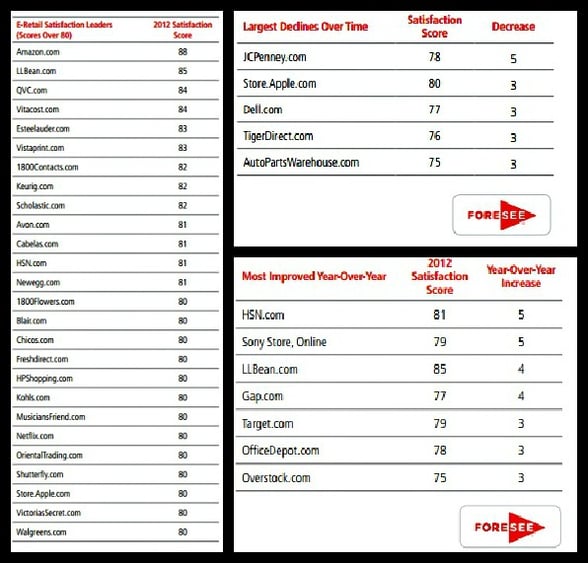Amazon Remains King of Ecommerce

Consumers once again crowned Amazon the king of ecommerce, according to a recent holiday survey from analytics firm ForeSee.
In fact, ForeSee's eighth annual Holiday E-Retail Satisfaction Index, which is based on more than 24,000 customer surveys collected from 100 top retailers during the 2012 holiday shopping season, reveals that Amazon remains the top online retailer for the eighth year in a row, with a customer satisfaction score of 88. Amazon's high score can partially be attributed to the retailer's variety of merchandise available on the site.
"At this point, Amazon has been dominant for so long and has such a history of focusing on the customer, its hard to imagine anyone else coming close," said Larry Freed, ForeSee president and CEO. "Companies should emulate Amazon's focus on the customer, which is clearly linked to superior revenues over the years."
One of the study's most surprising statistics shows that Apple's online retail store received its lowest customer satisfaction rating in four years, with a score of 80. However, Apple's rating is still better than the Index's average customer satisfaction score of 78, which some top retailers, such as Dell, failed to reach. In fact, Dell.com's rating fell four percent from last year and the company received a customer satisfaction score of 77. Furthermore, JCPenney.com's rating declined 6 percent to a score of 78, which was the biggest year-over-year decline of all companies.
"This year, we're seeing that even some of the largest companies in the country are at risk if they lose sight of customer satisfaction," said Freed. "Satisfaction with the customer experience, when measured correctly, is the most important predictor of future success, and while Amazon clearly gets it, Apple stumbles from their usual focus on the customer experience. Dell and J.C. Penney seem to be struggling to find their way, which could make them extremely vulnerable to competitors."
ForeSee's report indicates that online retailers should focus on improving merchandise factors, such as appeal, variety and availability of products, in the next year in order to increase customer satisfaction scores. This is because 67 percent of satisfied customers are more likely to return to a company the next time they need to purchase a similar product. Moreover, satisfied consumers are more likely to recommend sites to their friends and stay loyal to brands.









